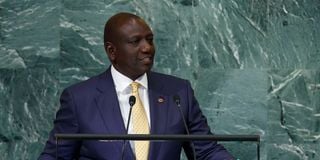President Ruto doublespeak may derail Kenya's clean energy push

President William Ruto speaks during the 77th session of the United Nations General Assembly at the UN headquarters on September 21, 2022, in New York City. President Ruto noted that historic droughts exacerbated by climate change lead to drying reservoirs and other water sources, and affect agricultural production.
What you need to know:
- In his maiden speech as the fifth President, he highlighted the urgency to deal with what he described as a “climate emergency” that is devastating the Horn of Africa.
- However, a month later, during his first foreign trip as Head of State, Dr Ruto held bilateral talks with his Tanzanian counterpart, President Samia Suluhu, and committed to building a 600km Tanzania-Kenya gas pipeline that, according to reports, will cost $1.1 billion (Sh132 billion).
- The natural gas pipeline is expected to run from Dar es Salam to Mombasa and ultimately to Nairobi. This is part of the longer-term plans to expand infrastructure between East Africa’s major economies and remove trade barriers.
Just what is President William Ruto’s stand on the use of fossil fuels?
In his maiden speech as the fifth President, he highlighted the urgency to deal with what he described as a “climate emergency” that is devastating the Horn of Africa.
The President said climate change would be among the central concerns of his administration, adding, he would make it his mission to encourage the use of alternatives to fossil fuels.
However, a month later, during his first foreign trip as Head of State, Dr Ruto held bilateral talks with his Tanzanian counterpart, President Samia Suluhu, and committed to building a 600km Tanzania-Kenya gas pipeline that, according to reports, will cost $1.1 billion (Sh132 billion).
The natural gas pipeline is expected to run from Dar es Salam to Mombasa and ultimately to Nairobi. This is part of the longer-term plans to expand infrastructure between East Africa’s major economies and remove trade barriers.
Mr Ruto explained that the project aims to lower energy tariffs for industrial and domestic users. Last week, Kenya announced that it had signed a deal with China, Russia, South Korea, and Slovakia to have its first nuclear power plant up and running by 2038.
Mr Justus Wabuyabo, the Legal and Regulatory Services Director and Corporation Secretary at the Nuclear Power and Energy Agency, explained that the mooted nuclear power plant with a 1,000-megawatt reactor will help avoid future power supply shortages and curb emissions as well as accelerate nuclear power and hydro projects.
According to experts, new investments in carbon-intensive sources of energy such as natural gas will take the country steps back and sidetrack Kenya in the global push to transition to a cleaner and net-zero carbon energy system.
In an exclusive interview with Nation, Mr Omesa Mokaya, an environmental and climate scientist pursuing his MSc in Environmental Science and Policy at Clark University, Massachusetts, USA, said BP’s Statistical Review of World Energy (2022) shows that Kenya is doing better in terms of low-carbon energy production, which stood at 87.97 per cent, compared to the global average of 37.37 per cent in 2021.
“This clearly shows that Kenya is a global leader in renewable energy production compared to most of the relatively richer and more developed countries in the West,” he observed.
During the recently concluded United Nations General Assembly in New York, President Ruto noted that historic droughts exacerbated by climate change lead to drying reservoirs and other water sources, and affect agricultural production.
“Further, Mr Ruto chaired a meeting of the Conference of African Heads of State on Climate Change, where he rallied his African counterparts to take strong and bold action on climate change, noting that Africa will be the most hit by the devastating impacts. It, therefore, remains a great paradox how quickly he has moved to embrace fossil fuels shortly after expressing commitment to embracing renewable energy. Is President Ruto preaching water and drinking wine?” Mr Mokaya posed.
Earlier this year, a new global report titled: “Fuelling Failure: How coal, oil and gas sabotage all seventeen Sustainable Development Goals” and published by Fossil Fuel Treaty, a global organisation that calls for total phasing out of fossil fuel, said oil, gas, and coal production, and emissions are a primary threat to water, health, biodiversity, and the ability to provide economic and energy security.
The report’s findings highlight the critical dangers that fossil fuels pose to all 17 sustainable development goals.
“Just like 50 years ago, when the world used international treaties to defuse the threats posed by nuclear weapons, today, the world needs a non-proliferation treaty to phase out fossil fuels and support dependent economies, workers, and communities to diversify away from fossil fuels, ensure 100 per cent access to renewable energy globally, and promote a just transition that leaves no-one behind,” the report said.
Dr Ruto has not issued any comments on the treaty, so it is not clear whether he supports the ideas it offered. However, he was once quoted as saying that he dreams of the country transitioning to 100 per cent clean energy.





